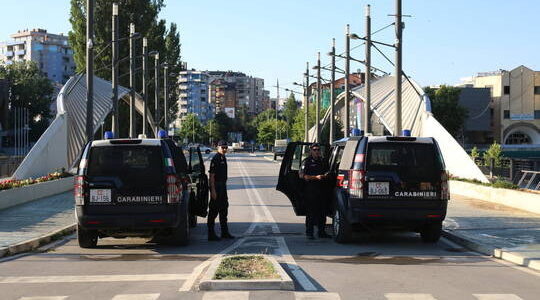
If Serbia-Kosovo tensions spiral into an outright conflict, Moscow is ready to assist Belgrade without playing a direct role, a Russian senator has said. The two sides clashed on Sunday, with demonstrators building barricades and unknown gunmen reportedly firing on Kosovo police.
“It is very dangerous, it is the center of Europe, and everything can end in a very sad way, because NATO forces are stationed there (in Kosovo),” Russian Federation Council member Vladimir Dzhabarov said in an interview with RIA Novosti news agency on Monday.

According to the lawmaker, the situation “may end in an armed conflict, and as soon as NATO countries get in there, of course, there is a danger that other countries that are allies of Serbia will be drawn in.”
His remarks were in response to a feud between Serbia and its breakaway province, officially called the Autonomous Province of Kosovo and Metohija in the Serbian constitution, which received recognition by several Western powers in 2008.

The government in Kosovo planned to ban the use of Serbian-issued license plates and ID papers starting from August 1, and to prohibit entry for anyone using Serbian-issued plates or documents, while also refusing to print temporary papers for travelers.
Belgrade officials have called it an attack on Kosovo’s Serb minority, and President Aleksandar Vucic accused Pristina of violating the rights of local Serbs, who “will not suffer any more atrocities.” While offering a chance for peace, he warned on Sunday that his government would not sit idly by if Serbs were targeted.
Kosovo has denied a crackdown on Serbs and accused Belgrade officials of undermining “the rule of law” on their territory. Prime Minister Albin Kurti has accused local Serbs of opening fire on police, and claimed his government is facing “Serbian national-chauvinism” and “misinformation” from Belgrade.
Tensions flared on Sunday on the Kosovo-Serbia border. Serbs in the north of the breakaway province set up roadblocks and rang alarm bells, as heavily armed special police under Pristina’s authority took control of two administrative crossings with Serbia.
READ MORE: Kosovo delays crackdown on Serbs
After a discussion with Washington, Kosovo officials decided to postpone the implementation of the controversial law for 30 days on the condition that Serbia remove barricades from the de facto border.
Credit: RT News
